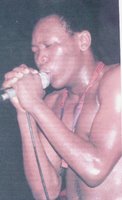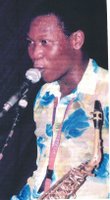seun anikulapo kuti and egypt 80

Seun Anikulapo Kuti, son of Afrobeat legend Fela, is playing new dates at the French Cultural Centre, Lagos. The first of the new shows took place last weekend. Seun & Egypt 80 are also in action tomorrow 15th April. Others dates are 22nd, & 29th April.
Here's what the French Cultural Centre has to say about Seun Kuti
For Seun Kuti son of late and legendary father who loomed large in Nigerian history, this is a particularly onerous task. Seun’s father, Fela Anikulapo Kuti, was Nigeria’s most beloved popular musician and most acerbic social critic until his death.
Seun grew up shouldering expectations that he would continue the work that his fathers had begun. But how can you emulate a lifestyle that may ultimately have been your father’s undoing? And how can you follow in your father’s footsteps when they lead straight to the gallows?" At nineteen, Seun is probably the youngest person on stage. Most of the band members, including Seun’s mother, who still sings backup, performed with Fela, and some look to now be in their fifties and sixties."As a matter of fact, Seun Kuti has been performing on stage since he was nine years old. He started his career as a backup singer in Egypt 80, the band fronted by Fela, the Afro beat king who had presided over Lagos’s popular music scene since the early 1970s. Seun says he started teaching himself how to play saxophone when he was eight, which is also when he started taking piano lessons. But on stage with his father he only ever sang, adding his child’s voice to the chorus of male and female backup singers that included his mother, the collective response to Fela’s persistent call.
Performing on stage with as many as twenty singers and musicians in regular sessions that sometimes went on all night was such an effective practical education that when Fela died in 1997, Seun, then just fifteen, was ready to take over. Since then, he has led Egypt 80 as lead vocalist and saxophonist, the focal point of a band that his father had forged into one of Africa’s most legendary ensembles. While Seun is the front man, a star in his own right who is routinely recognized by fans on the streets of Lagos, in many ways Egypt 80 is still his father’s band.
Fela’s Afrobeat was a pungent blend of funk and jazz with an African sensibility, reminiscent of James Brown but grittier, nastier and vaguely unsettling, like fermenting fruit. With Seun, Egypt 80 seem as explosive as they were under Fela, combining horns, keyboards, percussion, guitars and vocals in a sophisticated and overpowering blend that is at times discordant but always insistent. In the 70s the band performed almost nightly at The Shrine, a club Fela established, but these days they rehearse once a week and play three or four times a month at various venues around Lagos, sometimes alongside other artists.
In performance, Seun comes across as a perfect stand-in for his famous father. More often, he’s dressed like Fela in a ginger 70s-style two-piece paisley print outfit, the pants tight around his hips and the wide-collared shirt open at his chest. At 6’1’’ Seun is taller than his father and has a darker complexion, but his face has the same high cheekbones, impish grin and dark, mischievous eyes. Fela was a lewd prankster, and Seun seems equally outgoing, bold and playful, with a short attention span, a loud and ready giggle and a restless child’s energy. "Once you’ve met me, you can’t forget me," he boasts. "I’m crazy. It’s just the way I am. My father was too."His singing voice is deep like Fela’s, and his saxophone hits the lines and hooks his father composed with the same muscular style, although he tries to bring his own flavor to the obligatory solos on saxophone and synthesizer. And like Fela, on stage Seun lives up to a reputation as a sex symbol, shimmying, winding his hips and often discarding his shirt, to the delight of female fans.

Seun was literally born to do this, and seems unconcerned by the constant comparisons to his father, unlike his half brother Femi Kuti, twenty years his senior and a more established and internationally known performer. While Femi often seems to chafe under the burden of being his father’s son, Seun seems to embrace it. For Seun, taking up where his father left off is about building on Fela’s legacy, not trying to escape it. "If I’m in my father’s shadow then it doesn’t trouble me to be," he says. "If that’s all I can get, it’s a very good place to be. He was a very great man." He pauses. "But of course every artist wants to define themselves."Seun says he and his father were close, and Fela’s death at the age of 58 hit the teenager hard. Fela had other children by other women, but took a special interest in Seun, who is one of only two sons to follow their father into a career in music. But while Fela set Seun on a path much like his own, having inherited the leadership of Fela’s band, Seun can be more selective about what else he chooses to take from the example of Fela’s life. Although Seun likes to party and has a taste for Moët, he never smokes weed and appears monogamously devoted to his girlfriend Farida, a Lagos high school student.
In artistic terms he is also determined to chart his own course. Seun has just signed a deal with Virgin Records to record an album that will feature Fela songs as well as original tracks, and plans to innovate his own style, incorporating influences besides his father, including the hip hop (DMX, Wyclef Jean and Eminem are among his favorites) that comprises much of his own listening diet. And although he’s already a talented saxophonist, Seun hopes to refine his craft by pursuing formal musical training at the Trinity College of Music in London, where his father studied in the 1950s.
The prospective Virgin album will be the first time Seun records his own compositions, although he claims to have already written more songs than he can count ("My head is still hot," he says of his prodigious output). He’s never even performed his own songs, partly because he wants to perfect his own material in the studio before unveiling it for public consumption, unlike his father, who often debuts new songs on stage, recording them later.
"My father was stage to studio," says Seun. "I’m going to be studio to stage."
Seun once said "I have to play my father’s songs until I’m ready." With an album of his own creations in the works, presumably he’s finally set to stake his own musical claim instead of trading on his father’s name.In so doing, perhaps he can muster the kind of iconic voice and presence that made Fela one of his generation’s most politically influential cultural artists. It’s already clear that Seun’s name and music resonate with a new generation of Nigerians, many of whom are too young to remember his father’s heyday.
His songs sung in pidgin English, always retain a wide appeal for their humour and clever use of language, the music squarely dance-oriented and the lengthy on-stage polemics-haranguing captive audiences through a haze of smoke- is legendary. Talking of concert, we could mention just his very last concert in France during the 23rd edition of Festival Banlieues Bleues on February 25th 2006 where he thrilled fans of Afro beat for good six weeks that the festival lasted. Otherwise, we could just say the boy has performed all over the world. Seun promised to give a unique opportunity to concertgoers and lovers of Afro beat a solid dose of Baba 70 music.
The Afro beat message is as relevant now as ever and this show is the closest any audience will come to and witness the original Fela experience - expect a host of classics and an ‘unmissable’ night of West Africa's funkiest music.
Photos: Courtesy of the French Cultural Centre, Lagos.


0 Comments:
Post a Comment
<< Home